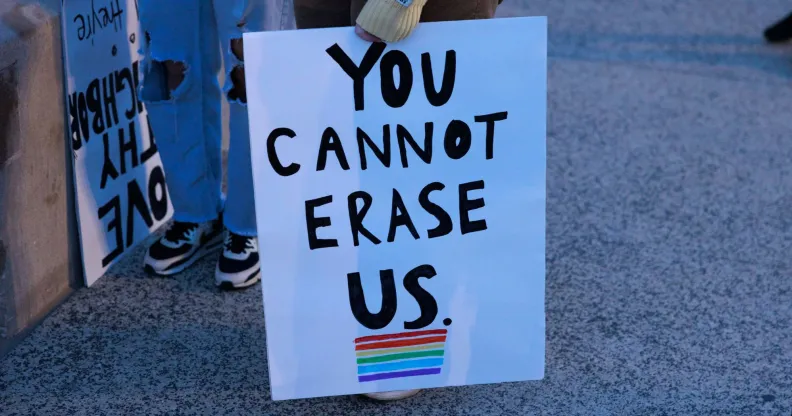Alaskan officials say it’s fine to discriminate against people simply for being LGBTQ+

A person holds a sign reading ‘You cannot erase us’ with a rainbow LGBTQ+ flag below it. (Getty)
LGBTQ+ people could face more discrimination in Alaska after guidelines regarding some equal rights were removed.
The move means guidance on how to deal with LGBTQ+ discrimination cases, other than those involving employment, will now be dropped.
Alaska’s original pro-LGBTQ+ human-rights stance, published in a report in 2021, promised equal protection for LGBTQ+ people in housing, the workplace, finance and government practices.
Following a Supreme Court ruling in 2020 – that made discrimination against people due to their sexuality or gender identity illegal in the workplace – Alaska published its own guidelines.
In the original guidance, the state’s Commission For Human Rights explained, in detail, LGBTQ+ discrimination guidance to help individuals know more about their rights. Those guidelines have now been removed.
Language promising equal protections for LGBTQ+ people has been deleted from the state’s website, and, in another blow, any active LGBTQ+ civil rights cases not relating to employment will no longer go ahead.
An investigation by news outlets revealed that the amendment was requested by a Christian group and made after advice was received from state attorney general Treg Taylor.
The announcement was published on a Twitter account with only 41 followers.
It read: “Based upon updated legal advice, ASCHR [the Alaska State Commission for Human Rights] will only be able to take LGBTQ+ employment discrimination cases filed under AS 18.80.220… LGBTQ+ discrimination applied to places of public accommodation, housing, credit/financing and government practices is void.”
Identity Alaska, a not-for-profit LGBTQ+ advocacy group, told ProPublica: “Without regard to sexual orientation or gender identity, all Alaskans should be protected against discrimination at the Alaska State Commission for Human Rights.”
Treg Taylor was approached for an interview by local news outlets but refused, giving a statement instead.
It read: “The department of law’s role is to provide legal advice to state government, based on the law. The department does not make policy. Policy decisions are left up to the department’s clients, which include most executive branch departments, divisions, agencies, boards and commissions, including ASCHR.
“As necessitated by changes in the law or the need to correct prior advice, the department will update the advice it has previously provided to its clients.”
Governor Mike Dunleavy appointed Taylor as attorney general after his predecessors Kevin Clarkson and Ed Sniffen courted controversy. Clarkson resigned after he was found to have sent hundreds of unwanted texts to a much younger female colleague, and Sniffen was charged with three felony counts of sexual abuse of a minor. Appearing in court in September, he denied all the allegations.
Dunleavy also recently announced a bill requiring an increase in parental permission before the teaching of lessons on sex education.
If passed, the new legislation would require students to seek permission from their parents before being able to change their pronouns and join a club related to gender and sexuality. The move would, effectively, force students to out themselves to their parents.
The bill also seeks to force trans people to use changing rooms assigned to their biological sex at birth, describing the move as promoting “physical safety and privacy” of students.
‘This is hurting people’
Brandon Nakasato, who served on the human rights commission in Alaska from 2016 to 2019, said legislation is hurting people in the state and more needs to be done to ensure that LGBTQ+ people are awarded equal discrimination protections.
“I was one of those little gay kids [who] considered killing themselves, living in a rural area, who believes that they were the weirdest person on Earth,” he said. “And there are teens like that in the (Alaska) Bush right now who need to hear that their leaders are caring for them too.
“Legislators need to hear how this lack of protection is hurting people.”

